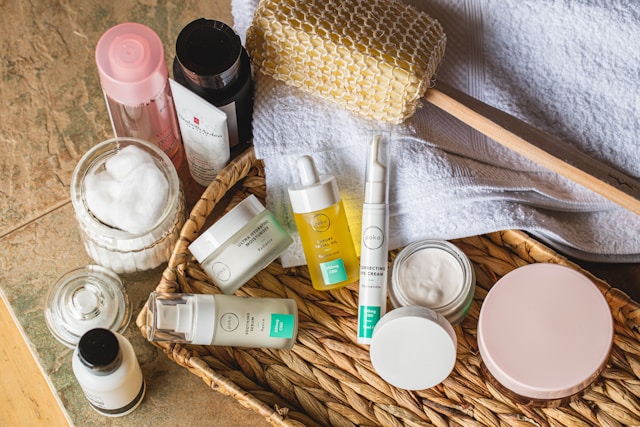Skincare Routine for Beginners: What to Use and When

Starting a skincare routine might seem hard, but it’s simpler than you realize. By following some easy steps and using the right products, you can have healthy, radiant skin. This easy guide explains what to use and when to use it, so you can create a routine that helps you.
Know Your Skin Type
Knowing your skin type is important before you begin a skincare routine. Dry, oily, combination, sensitive, and normal skin types fall into this category. Dry skin is tight and might peel, whereas oily skin has large pores and produces plenty of oil. Combination skin contains both dry and oily areas.
Healthy skin normally feels pleasant and hardly ever breaks out or has pimples, although sensitive skin might respond differently. Once you find out what type of skin you have, you can pick the right products for it. This step helps get better results and stops any unwanted irritation. Always adjust your skincare routine to fit what your skin needs. A custom routine is the best way to begin.
Why a Routine Matters
Taking care of your skin works best when you do it regularly. Keeping your skin clean, moist, and protected demands a daily skin care routine. Morning and evening routines serve diverse purposes. Mornings help get your skin ready for the day and keep it safe. Nights are for healing, resting, and moisturizing. If you don't follow a routine, your skin can get irregular.
Not taking care of your skin regularly can cause pimples or dryness. Using the right products every day can make your skin look a lot better. Just like brushing teeth, skin care is a simple habit that helps long-term health benefits. Taking care of your skin regularly takes time, but it can really help.
Cleansing in the Morning
You remove sweat, oil, and last night's makeup when you wash your face in the morning. A mild soap is used daily to help keep your skin's natural oils. Gel cleansers are the most suitable choice for oily skin, while cream or milk cleansers are appropriate for dry or sensitive skin.
This process enhances the absorption of lotions, toners, and serums. To cleanse your skin mildly, use warm water rather than hot water, which tends to dry out your skin. Even if your skin looks clean, wash it all the time to prevent oil and bacteria buildup overnight.
Cleansing at Night
Cleaning your face at night is important for getting rid of makeup, sunscreen, and dirt. Your skin gets dirty during the day. Begin with a cleanser that uses oil if you have makeup or sunscreen on. Employ a water-based face wash; thorough cleansing is guaranteed through twice washing. It makes sure your pores are clean before you use treatments.
Not washing your face at night can cause clogged pores and pimples. Choose a gentle facial cleanser that is suitable for your skin type; avoid using harsh soaps or scrubbers. Cleaning your skin properly makes it smoother and helps it look brighter over time. Clean skin is the base of your whole routine.
What Does a Toner Do?
Toner helps bring the skin's balance back after washing. Toners enhance the penetration of moisture into the skin; others strip away dead skin cells or decrease oil. Hydrating toners are good for dry and sensitive skin. Exfoliating toners help prevent pimples and reduce oily skin. Use a cotton pad or gently apply it with clean hands.
Stay away from toners with alcohol because they can make your skin feel bad. Use toner in the morning and at night after cleaning your face. A good toner can calm, lighten, and freshen up your skin. Don't use strong ingredients too much, as they can dry out or hurt your skin. Pick based on how your skin feels and what it needs right now.
The Role of Serums
Serums send strong ingredients deep into the skin. They deal with problems like a lack of shine, pimples, or getting older. Use a vitamin C serum in the morning to make your skin look brighter. Serums with hyaluronic acid hydrate dry skin, and niacinamide reduce redness and oil.
Starters have to use retinol cautiously, but it is useful for night aging. Following toning, use serum, let it absorb, and moisturize. Serums are usually light but very effective. Pick one based on your main skin worry. Always test new serums on a small area of skin first to prevent any bad reactions.
Choosing the Right Moisturizer
Moisturizer adds moisture to your skin and helps keep other skincare products in place. Even people with oily skin need to use moisturizer every day. While oily or acne skin types are best served by creamy moisturizers, gel moisturizers are suitable for oily or acne skin. If you are sensitive, choose products that don't have any scent.
Moisturizers cover skin; for better absorption, use on wet skin. Daytime creams are best as lighter products; nighttime creams offer extra moisture. The skin remains soft and healthy when moisturizer is applied twice daily; select one based on your skin type.
Sunscreen is Essential
Sunscreen is a necessity in your daily routine. It is necessary for healthy skin because it inhibits UV damage, slows aging, and decreases the risk of skin cancer. Use sunscreen even when it's cloudy or if you're inside by a window. Use a broad-spectrum sunscreen with SPF 30 or higher to protect your skin from UVA and UVB radiation.
Mineral sunscreens are suitable for sensitive skin; every two hours, reapply. It isn't sufficient to only use SPF cosmetics. Apply sunscreens liberally to all the skin exposed as the final step of your morning routine. Using it regularly can stop dark spots and early wrinkles.
Exfoliating the Right Way
Exfoliation gets rid of dead skin and helps other products work better. There are two main kinds: physical and chemical exfoliants. Scrubs that you use on your skin can be rough and create tiny tears. Chemical exfoliants like AHA and BHA effectively cure dry skin and reduce small wrinkles. BHAs are great for skin that is oily or has acne.
Exfoliate once or twice a week to make sure you don't do too much. Using too many exfoliants can hurt your skin’s protective layer. Always put on moisturizer after scrubbing your skin to keep it calm and smooth. Don't scrub skin that is sore or damaged. Use exfoliants at night for the best outcome. Make sure to use sunscreen the next day.
Eye Creams and Their Purpose
Eye creams are made for the sensitive skin around your eyes. They help to lessen swelling, dark circles, and small wrinkles. Use your ring finger to gently press it in. Use the serum in the morning and evening without pulling or touching the skin around your eyes. Caffeine creams help reduce swelling and make the area look brighter.
Retinol eye creams help reduce wrinkles and small lines. Moisturizing eye creams are best for dry or irritated eyes. Don't put cream near your eyelashes. Even a small amount can have a big impact. Using it regularly will show noticeable improvement as time goes on.
Conclusion
Taking care of your skin doesn’t need to be confusing to work well. Start with the essentials: a face wash, a lotion to keep your skin soft, and sunscreen, then add more products later. Know your skin type, pick products carefully, and be regular with your routine.
Don't make the usual mistakes and let your skin get used to changes. With an easy, customized routine, you will see noticeable changes. Be calm, clever, and patient. Great skin isn’t about being perfect—it’s about taking care of it regularly and making choices that are good for it.










